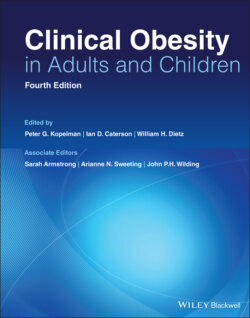Читать книгу Clinical Obesity in Adults and Children - Группа авторов - Страница 23
Historical analyses of contributors to obesity
ОглавлениеWeight gain leading to obesity occurs when energy intake from food exceeds energy expenditure from physical activity and metabolic processes over a considerable period. There has been much speculation as to the main driver of the global obesity epidemic, and this has often led to intense debate (see the analysis by Swinburn et al. [54] and the responses this generated). A complex and diverse range of factors can give rise to a positive energy balance, but it is the interaction between a number of these influences, rather than any single factor acting alone, that is thought to be responsible. The genesis of obesity at an individual level often focuses on a lack of cognitive control over personal behaviors that directly influence energy intake and ignores the critical role of physiological processes in driving or attenuating these behaviors. In addition, it is now recognized that powerful societal and environmental forces influence energy intake and expenditure through effects on dietary factors and physical activity patterns and may overwhelm the physiological control of body weight. It is the emergence of these environmental forces and the adjustments brought about by rapid changes in society which are the focus of most attempts to explain the emergence of the global obesity epidemic. The key elements of this transition and the emergence of our understanding around them are now set out below.
